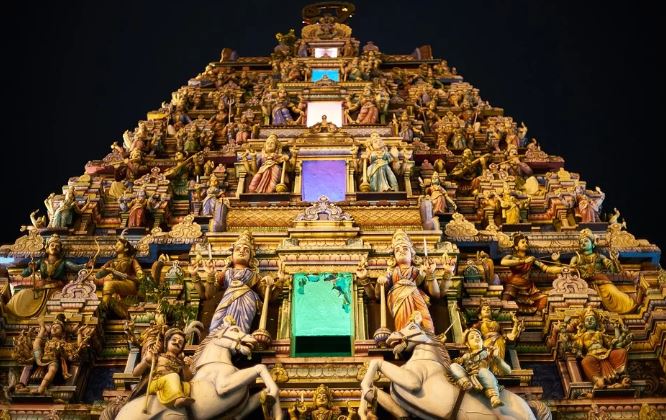A Look at Hinduism’s Effect on World Religions:
A Simple Look at Entropy, Henotheism, and The Shape of Religion to Come
In the study of religions, all is entropy. Remember this one fact, and every event that happens in the world that relates to religion, which is actually everything, will make sense.
There is a very simple principle in physics known as entropy, which, in plain terms, states without boundaries all things tend toward greater and greater chaos.’
For example, leave a window open on a cold winter night and all the heat escapes and cold rushes into the house. Hot and cold moving in and out. What was formerly cold on the outside and heat inside, kept apart by windows and doors, is now in a state of chaos. Entropy.
But, it is not chaos the way we traditionally think of chaos. Instead, in entropy, chaos is actually the movement of all things toward equilibrium. Leave that window open long enough, and eventually, the temperature inside becomes equal to the temperature outside. The formerly indoor hot’ molecules have rushed together and mixed with the previously outdoor cold’ molecules, such that they are now all jumbled together in a balance, and the temperatures indoor and out have equalized.
All is Entropy
Again, the most important thing to remember in the study of religions is that all is entropy. In eras past, countries, cultures, and, yes, religions were either kept apart by boundaries imposed by fierce wars, such as is still seen today in the Middle East; or they were subsumed by other countries, cultures, and religions in those same fierce wars, as is often seen when reviewing American history.
Today, while war has not dropped out of fashion, a clear demarcation between religions has. Just like the cultures in which they were formerly embedded, religions have raced around the world. Transmitted through intercontinental travel, the internet, the intermarrying of peoples, and, at the very least, the experimentation with new foods from around the globe, religions both big and small have made their way into living rooms from Tiannenmen Square to Timbuktu, and from Trent to Tallahassee.
This is nowhere more evident than in America and Western Europe. As Christianity has fallen into disfavor in the last four decades, all sorts of other religions and spiritual movements have sprung up to take its place. Islam and Buddhism have been the most popular among more conservative and more liberal people, respectively.
But, not only have religions spread everywhere, they have actually themselves become mixed. For example, there is a great deal of Buddhism found in Christian Churches, nowadays. Similarly, Buddhism and other religions long ago became infused with the teachings of Jesus on compassion and love as Christian missionaries fanned out across the globe.
What is most fascinating, however, is the role of Hinduism on the world religions stage. For, in many respects, Hinduism the religion that birthed Buddhism and pre-dates Christianity by centuries is a microcosm of this world-wide entropy. With its three million gods, Hinduism has, from its very beginning, been jelling, mixing, and sifting the best of all there is to be had. From Shiva to Vishnu, from Kali to Ganeesh and beyond, the gods of Hinduism offer anything any person could want.
Monotheism.
Except for one thing. Monotheism. Hinduism has classically been considered a polytheistic‘ religion, or a religion of many gods.
And, in the past, this one fact has caused many in the monotheistic religions of Christianity, Islam, and Judaism to reject Hinduism as primitive. However, the polytheist’ label is not altogether accurate, and, considering entropy, this primitive’ religion will more than likely be a prototype of the future.
 See, people around the world already worship many different gods. From money to Jahweh, from children to Allah, from nature to career to food to sex and to Self, there are hundreds if not millions of gods to which we give homage.
See, people around the world already worship many different gods. From money to Jahweh, from children to Allah, from nature to career to food to sex and to Self, there are hundreds if not millions of gods to which we give homage.
And this is the great lesson Hinduism this oldest of religions has to teach us. In the world of the future the religious answer indeed, the only answer for religious peace! is neither monotheism nor polytheism, per se, but classic Hindu henotheism.
Henotheism is, simply put, the acknowledgment of many gods, while worshipping just one primary god. Whether that god is what Americans traditionally think of on Sundays as God’ or whether it is the god of mammon,’ or money, so many worships every other day of the week, the bottom line is that a god is more than just a being floating around in the sky. A god is that which consumes us, that which we worship, that for which we expend our resources, and that which, as indicated by our actions, is of central focus in our lives.
The great gift that Hinduism brings to the table as we move into an increasingly unbounded and jelling world is a blueprint for how to co-exist without killing each other in a my-god-can-beat-up-your-god global sandbox fight. As we move toward greater religious equilibrium the henotheistic mindset of godly co-existence is precisely the script necessary to be passed down to us mortals in teaching us how to get along.
Hinduism, this grand old statesman of religions, has a great deal to teach if only the younger cultures and younger religions will take time to learn.






